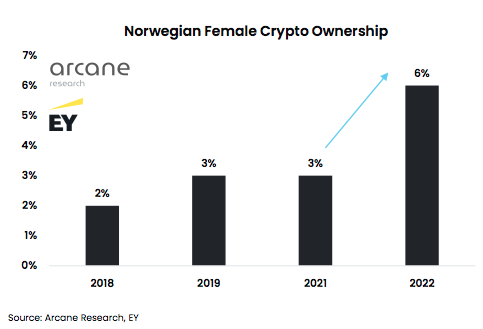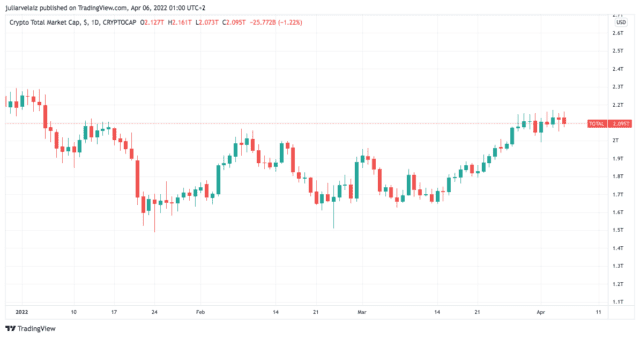In the fourth survey about crypto adoption ran in Norway by Arcane Research and Ernst & Young (EY) in 2018, they find that the industry is booming in the country with the levels of ownership that have doubled from 5% to 10%. Moreover, bitcoin miners seem to be attracted to several traits of the country.
Crypto Is Booming In Norway
Arcane Research shows in its latest weekly update data from a survey conducted by themselves and EY. The study found that at the moment around 420,000 Norwegians currently own cryptocurrencies. This translates to 10% of Norway’s adult population owning digital assets, an increase of 120,000 people or 7% since 2021.

The gender gap in crypto adoption seems to be closing in the country. Norwegian females are showing higher interest in crypto this year with a rate of crypto ownership that doubled from 3% in 2021 to 6% in 2022.
63% of the surveyed females said to have purchased crypto for the first time between 2021 and 2022, with a 24% share happening in the first months of this year alone, which indicates the increasing interest.

Similar to several studies that research levels and demographic traits of crypto adoption in multiple countries, this latest survey found that “most crypto owners are young adults, and the older you get, the less likely you are to hold crypto.”
Most crypto owners in the country are younger than 40 years old, a pattern that remains unchanged since 2021. The generational divide shows that 18% of crypto owners are between the ages of 15-29 yr, 20% are 30-39 yr, 8% are 40-49 yr, then barely 3% are 50-59 yr and 2% are over 60 yr. Older adults are still skeptical of crypto and prefer traditional stocks.
Bitcoin is the most popular digital coin in the country taking two-thirds of all Norwegian crypto investors’ holdings, followed by Ethereum in second place and usual, plus XRP and ADA in third and fourth place. It appears that Norway’s largest retail exchange, Firi, could be causing the high levels of XRP and ADA adoption after having adopted six tokens: BTC, ETH, XRP, ADA, LTC, and DAI.

Why Bitcoin Mining Is Big In Norway
Arcane Research recently identified 120 MW of bitcoin mining operations in the country (pinned by miners in the map below), which means that Norway currently produces 0.77% of all Bitcoin’s hashrate, not the biggest share yet but an interesting number that goes along with the increasing crypto adoption. Also worth considering that it’s a small country.

Reportedly, bitcoin miners are prioritizing the use of renewable energy to power their operations, and hydropower is the main source of Norway’s energy with an 88% share of the electricity generation, followed by 10% of the energy generated from wind and only 2% that comes from natural gas.
Related Reading | Intel Blockscale ASIC, New Bitcoin Mining Chip Available Q3 2022
This is an attractive incentive as more miners are pushed towards generating a minimum carbon footprint over recent environmental pressure.
On top of that, Norway’s electricity mix also provides the country with one of the cheapest electricity in the continent, even with a recent increase that took it to $0,09-$0,04 per kWh, depending on the zone. The north still enjoys cheap energy prices and is expected to stay the same.
The country is politically stable and its legal framework can also attract bitcoin miners. However, the crypto mining activity is not so popular in the country and it has faced political opposition that harmed its previous amicable regulatory reputation. Intends of banning mining operations have been unsuccessful, but some uncertainty remains.
Related Reading | There Are Only 2 Million Units Of Bitcoin Left To Mine — Why Does It Matter?
Meanwhile, Norwegian miners are trying to contribute to the energy sector by proving grid balancing or reusing the excess heat from their operations, claims Jaran Mellerud from Arcane Research.
“These waste-minimization initiatives can benefit Norway, both from an economic and ecological perspective since heating makes up a significant share of the cold country’s energy consumption. At the same time, heat is bitcoin miners’ main waste component.”



